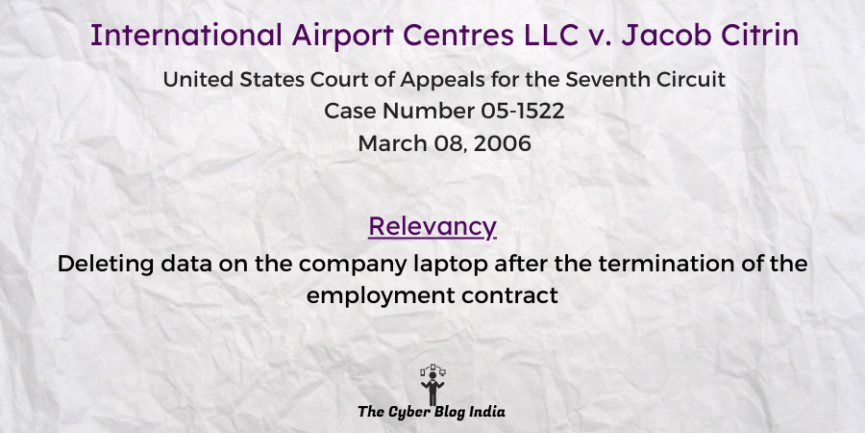International Airport Centres LLC v. Jacob Citrin

International Airport Centres LLC v. Jacob Citrin
440 F.3d 418
In the United States Court of Appeals for the Seventh Circuit
Case Number 05-1522
Before Circuit Judge R. Posner, Circuit Judge A.C. Williams, and Circuit Judge D.S. Sykes
Decided on March 08, 2006
Relevancy of the Case: Deleting data on the company laptop after the termination of the employment contract
Statutes and Provisions Involved
- The Computer Fraud and Abuse Act, 18 U.S.C. § 1030
Relevant Facts of the Case
- The defendant-appellee was an employee of the plaintiff-appellant. The plaintiff had given the defendant a company laptop to research and record potential properties for acquisition.
- He stored the research on this laptop. After this, he quit the plaintiff’s employment to pursue self-employment. This was in breach of his employment contract.
- Before returning the laptop, he used a secure erasure program to delete the files stored on the laptop. This program wrote over the deleted files to prevent their recovery. As a result, the plaintiff had no copies of the files he erased.
- The plaintiff did not have a backup of deleted data and, thus, could not recover. Subsequently, the plaintiff filed a suit against the defendant in the District Court under the Computer Fraud and Abuse Act (CFAA) provisions. The US District Court for the Northern District of Illinois ruled in the defendant’s favour.
Prominent Arguments by the Counsels
- The plaintiff-appellant’s counsel submitted that the deleted data could have revealed his misconduct. By quitting his job, he was already in breach of the employment contract. Further, deleting the defendant’s data was in violation of 18 U.S.C. § 1030(a)(5)(A)(i). This provision talks about knowingly transmitting a program resulting in damage without authorisation.
- The defendant-appellee’s counsel argued that merely erasing a file from a computer is not transmission. The counsel submitted that the employment contract authorised him to return or destroy data in the laptop when his employment ended.
Opinion of the Bench
- The plaintiff’s submission does not state whether the defendant downloaded the secure erasure program from the internet or installed it via an external storage device. However, the precise mode of transmission will not have any difference.
- The defendant’s authorisation to access the laptop ended when he engaged in misconduct and decided to quit his job.
- CFAA defines “without authorisation” and “exceeding authorised access” separately; however, the difference is very thin.
- It is unlikely that the employment contract authorised the defendant to delete data that he knew the company had no duplicates of and would have wanted to keep.
Final Decision
- The court reversed the District Court’s decision with directions to reinstate the suit, including supplemental claims.
